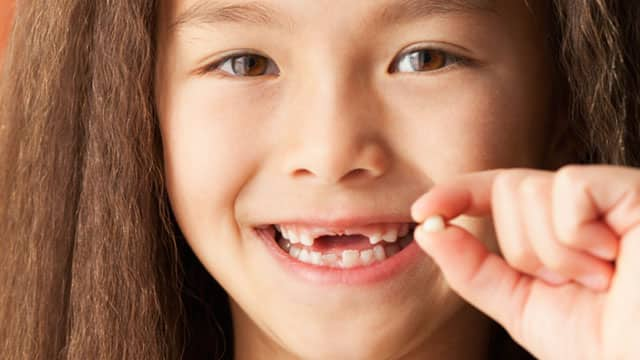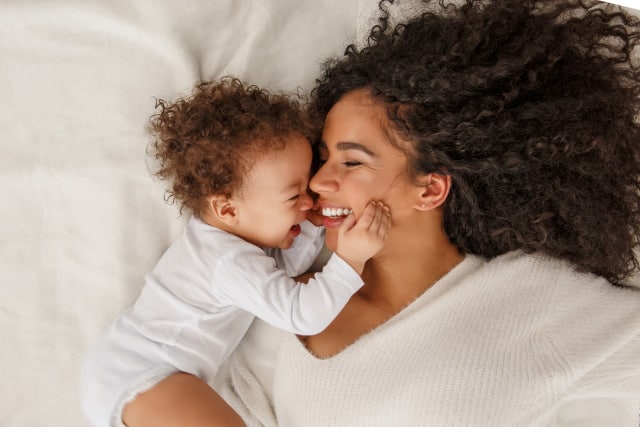-
-

FLUORIDE
What Is Stannous Fluoride Toothpaste?Discover what is Stannous Fluoride Toothpaste and its importance to prevent cavities and other oral health problems.

TEETH WHITENING
Whitening toothpaste - hydrogen peroxide vs. carbamide peroxideIf you lose one or more of your front teeth due to injury or decay, you may feel ...
-
Science & InnovationOral Health Commitment
- Oral Health Commitment
- Bright Smiles, Bright Futures
- Educational Resources
- Mobile Dental Van
- Volunteer
- ORAL HEALTH CHECK
- PRODUCT MATCH
- Oral Health and Dental Care | Colgate®
- Oral Health
- How To Survive The 'Losing First Tooth' Milestone Healthily


Every child responds differently to losing their first tooth; your child may feel excited about the tooth fairy's first visit or nervous about the pain. Most children lose their first baby tooth, also known as a primary tooth, around six years old, and their last primary tooth between nine and thirteen. Are you wondering what to do when your child loses their first baby tooth? Here are some tips on how to care for the empty socket after the tooth has fallen out.
Clean Your Child's Gums
It is perfectly normal for your child to bleed after losing their tooth, so the first thing you can do is clean the area. Use a soft or sterile gauze to wipe their gums gently. You can also have your child rinse their mouth with warm saltwater, this may be a little unpleasant, but it will help clean out the empty socket.
Use a Topical Anesthetic
Your child may experience some initial pain or discomfort after their baby tooth has fallen out. An over-the-counter topical anesthetic is a fast and easy way to relieve this. Remember to clean the area and wait for the bleeding to stop before using any anesthetic ointment.
Add an Anti-Inflammatory
Does your child have a swollen socket? Swelling is caused by wiggling the loose tooth before it is ready to fall out. Use a dose of children's ibuprofen to help decrease inflammation. Be sure to contact your dentist if the swelling persists.
Focus on Good Oral Care for The Whole Mouth
Inadequate care for baby teeth can affect the development of adult/permanent teeth. Teach your child about the importance of taking care of their teeth and practicing good dental care daily. A good oral care routine will help protect their teeth and reduce the risk of plaque buildup and early gingivitis. Here are some dental hygiene steps that will help maintain a healthy smile:
- Your child should gently brush their teeth twice a day with a soft-bristled toothbrush.
- Remind your child to floss or clean between their teeth once a day.
- Avoid excess of sugary snacks and try healthier alternatives.
Losing the first baby tooth is a big moment for both child and parent. Your child might feel excited or even scared about losing their tooth. In addition to making them feel comfortable about this normal stage of growing up, you may have questions about what to do too. The first thing to do is to clean the socket. If your child experiences pain or inflammation, use a topical anesthetic or an anti-inflammatory to ease discomfort.
Most importantly, continue to develop a regular schedule and a healthy relationship with your child's dentist to assuage any fears your child may have. Provide positive reinforcement and encouragement while they're young, and it will encourage good dental habits as they become adults.
Oral Care Center articles are reviewed by an oral health medical professional. This information is for educational purposes only. This content is not intended to be a substitute for professional medical advice, diagnosis or treatment. Always seek the advice of your dentist, physician or other qualified healthcare provider.
Related Articles

Mouth and teeth anatomy
What Are Dentin Tubules?Have you heard of the term dentin tubules? Well, now you have. Dentin tubules are a vital part of your teeth. As you may know, the teeth are made up of tissue layers, and each one serves a unique function. The dentin tubules are located in the dentin, one of the layers below the enamel surface. The role of dentin tubules is to help you feel sensations in your teeth. That's also why they're often blamed for hypersensitivity in people's teeth.

Mouth and teeth anatomy
What Is Hypodontia? Causes And Treatments For Missing TeethHypodontia refers to the absence of one or more teeth. Learn how this condition is diagnosed and treated.

Mouth and teeth anatomy
What Are Foliate Papillae?Hundreds of tiny bumps called papillae cover your tongue, most of which contain taste buds with sensory cells. There are four types of papillae—filiform, fungiform, circumvallate, and foliate—and each has a role to play. This article looks into the foliate papillae, which are located on the sides of the tongue and contain taste buds.

Mouth and teeth anatomy
Your Baby's Labial Frenulum: What You Need To KnowTucked inside your infant's gummy, toothless smile is a small piece of tissue under their upper lip called the labial frenulum.
Related Products

Colgate Total Active Prevention Whitening Toothbrush is a soft toothbrush with charcoal infused spiral and Floss-Tip bristles (1). This soft bristle toothbrush fights the root cause* of cavities, plaque, gingivitis, bad breath, tartar buildup**, and stains*** and also helps remove surface stains to prevent stain buildup.

Power away plaque with Colgate Total Battery Powered Toothbrush. This battery operated toothbrush for adults fights the root cause* of cavities, plaque, gingivitis, bad breath, tartar buildup**, and stains***. Plus, this battery toothbrush has a built in 2 minute timer and features two cleaning modes, Sensitive and Regular, to cater to your unique oral care needs.

The Colgate Total® Active Prevention Foaming Clean Soft Bristle Toothbrush is specially designed to tackle the root cause* of cavities, plaque, gingivitis, bad breath, tartar buildup**, and stains***.

Colgate Total Alcohol Free* Gum Health Mouthwash delivers 24-hour protection** against bacteria and also helps prevent gum problems

Helping dental professionals
More professionals across the world trust Colgate. Find resources, products, and information to give your patients a healthier future




